What we do
MSF focuses on emergency, paediatric, and maternal healthcare in Afghanistan, which has one of the highest maternal mortality rates in the world.
We work in one hospital in Helmand province in collaboration with the Ministry of Public Health. We also run a maternity hospital in rural Khost province, a drug-resistant tuberculosis programme in Kandahar, and a trauma centre in Kunduz. We treat malnourished children, who have been displaced, in Herat province.
Major attacks on MSF hospitals have occurred in recent years; in October 2015, US airstrikes destroyed our trauma centre in Kunduz, killing 42 people. An armed group attacked our maternity wing at Dasht-e-Barchi hospital in Kabul in May 2020, with 16 mothers and an MSF midwife among those killed. In the wake of the attack, we made the difficult decision to withdraw from the hospital in Kabul, leaving women in the area without critically-needed emergency obstetric care.
In August 2021, the Islamic Emirate of Afghanistan (also known as the Taliban) entered the city of Kabul as the government collapsed. MSF teams have stayed in place and continue to provide care.
- Afghanistan
People struggle to access medical care in Afghanistan, where – even as the government has collapsed and uncertainty has set in – we remain to address people’s needs.
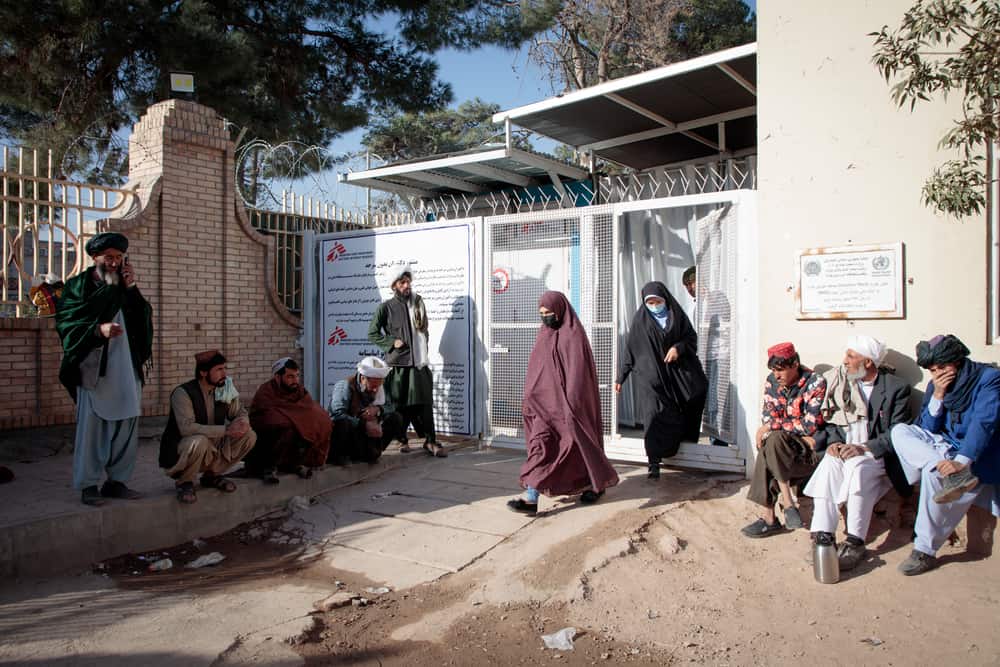
What are we doing in Afghanistan?
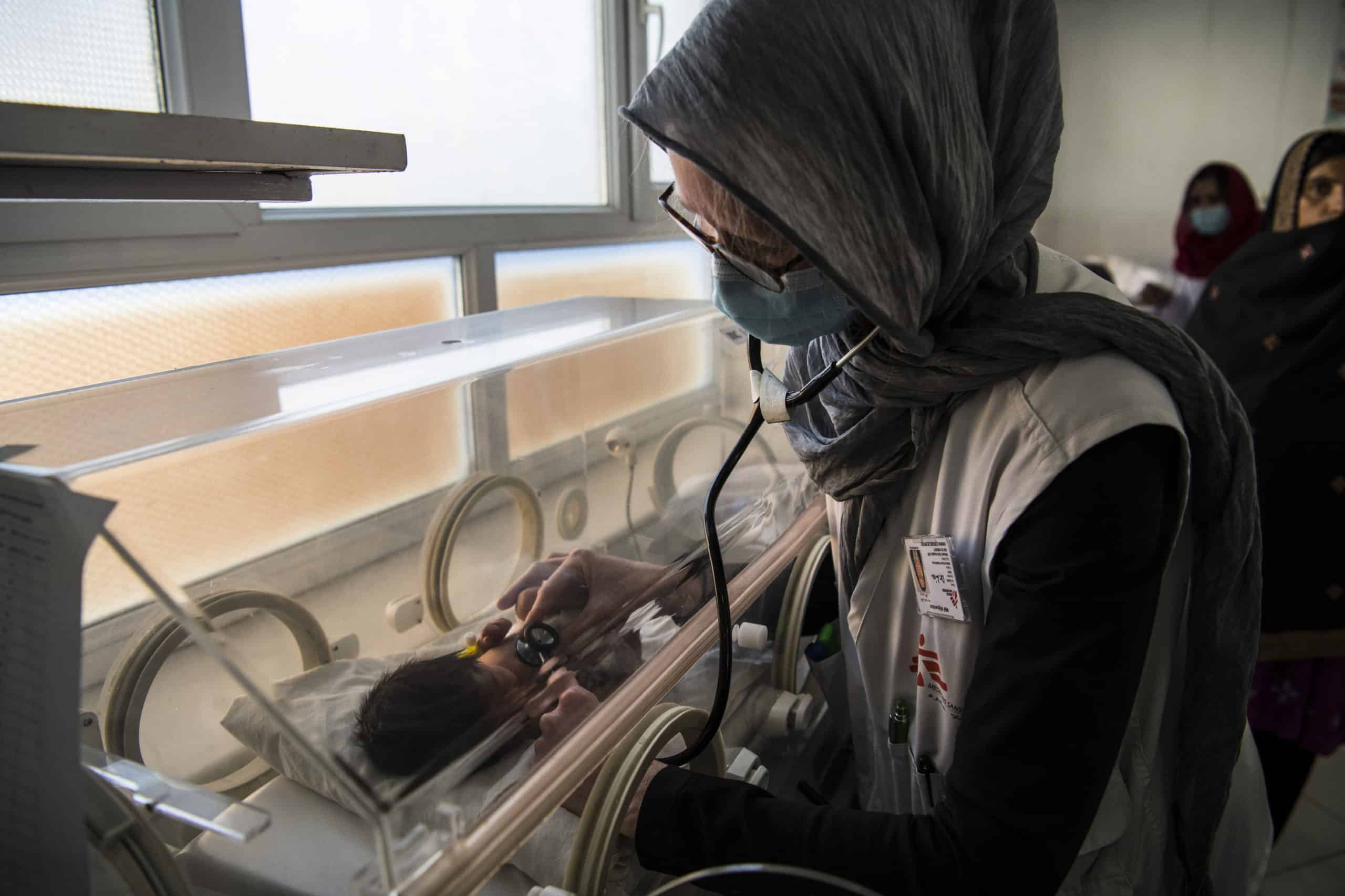
Maternal healthcare
By providing free, high quality maternal and neonatal healthcare in two hospitals in Helmand and Khost provinces, we aim to help reduce death and sickness in mothers and their newborns in one of the most dangerous places in the world to give birth. Training medical staff is an integral and important part of our projects. We place an emphasis on training local female staff through our projects in Afghanistan. Almost all the midwives are Afghan women, some of whom have become highly experienced in managing complicated deliveries since we opened our maternity hospital in Khost in 2012.
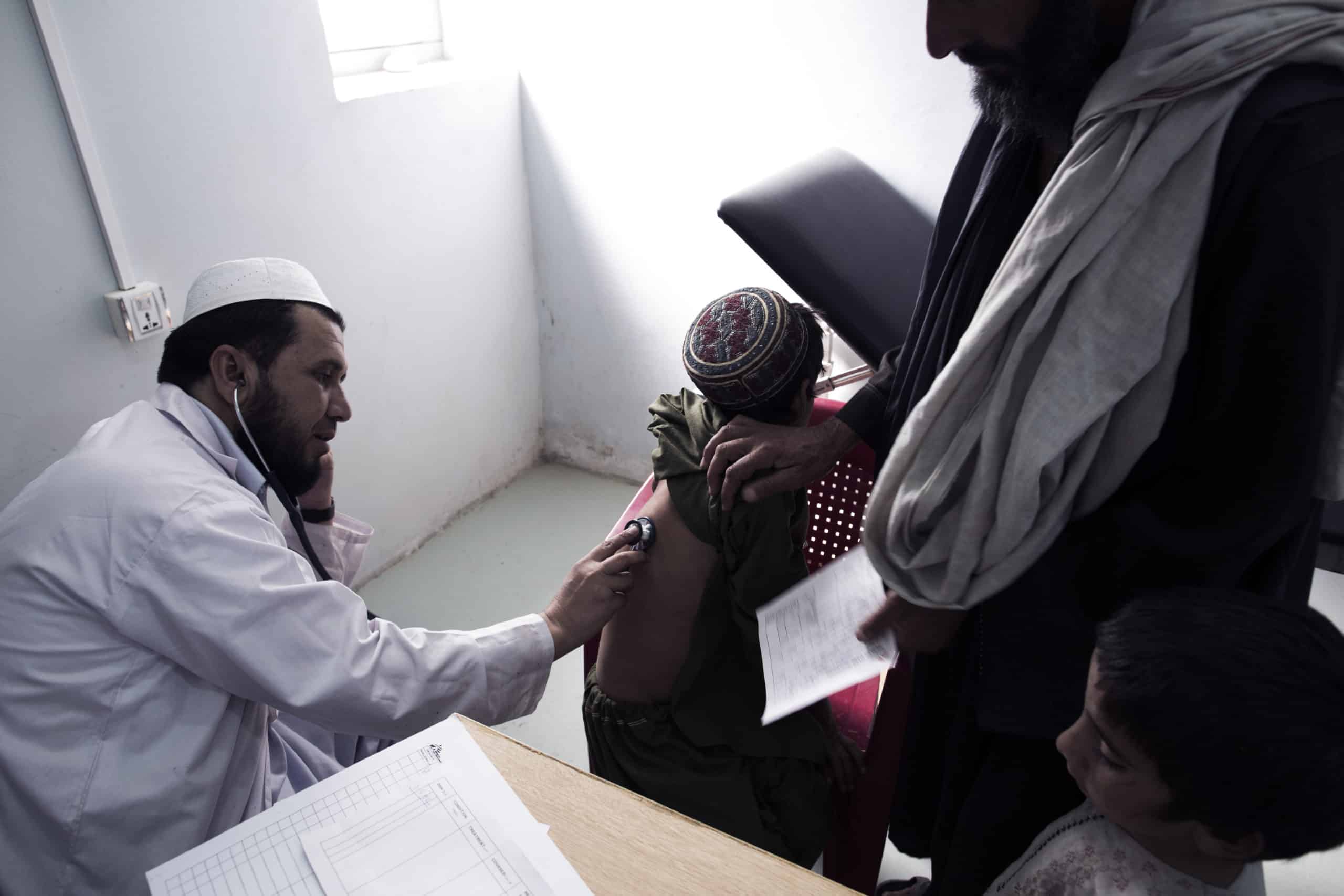
Tuberculosis treatment
We support the diagnosis and treatment of drug-resistant tuberculosis. In Kandahar province, in the south of the country, we run a laboratory, as well as facilities for hosting patients during their treatment. In December 2019, we introduced a nine-month oral regimen allowing DR-TB patients to change from injectable drugs to pills and reduce their number of consultations at the hospital. The shorter, all-oral treatment produces fewer side effects and improves the patients’ quality of life. We also provide support to Mirwais regional hospital, and organise training for other facilities in Kandahar to improve the detection of TB, including drug-sensitive cases.
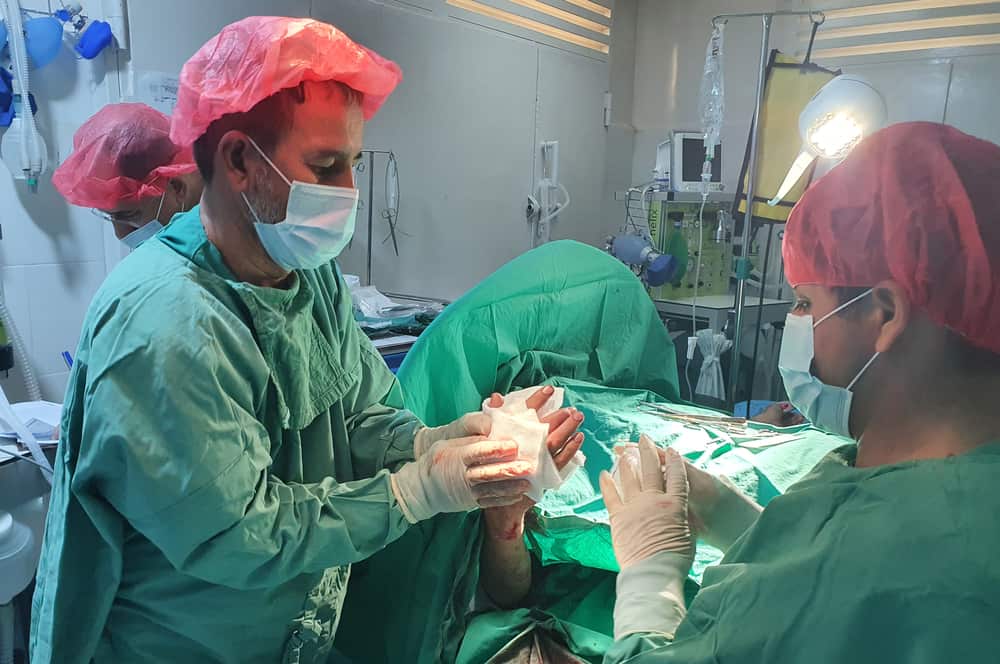
Trauma care
The MSF Trauma Centre in Kunduz continued to serve as a critical facility for emergency care, receiving over 32,000 patients in 2024. Our teams performed nearly 4,750 surgical procedures, treating severe injuries and life-threatening conditions. The antimicrobial stewardship programme at the Trauma Centre played a vital role in addressing multi-drug-resistant infections, improving patient outcomes and ensuring responsible use of antibiotics.
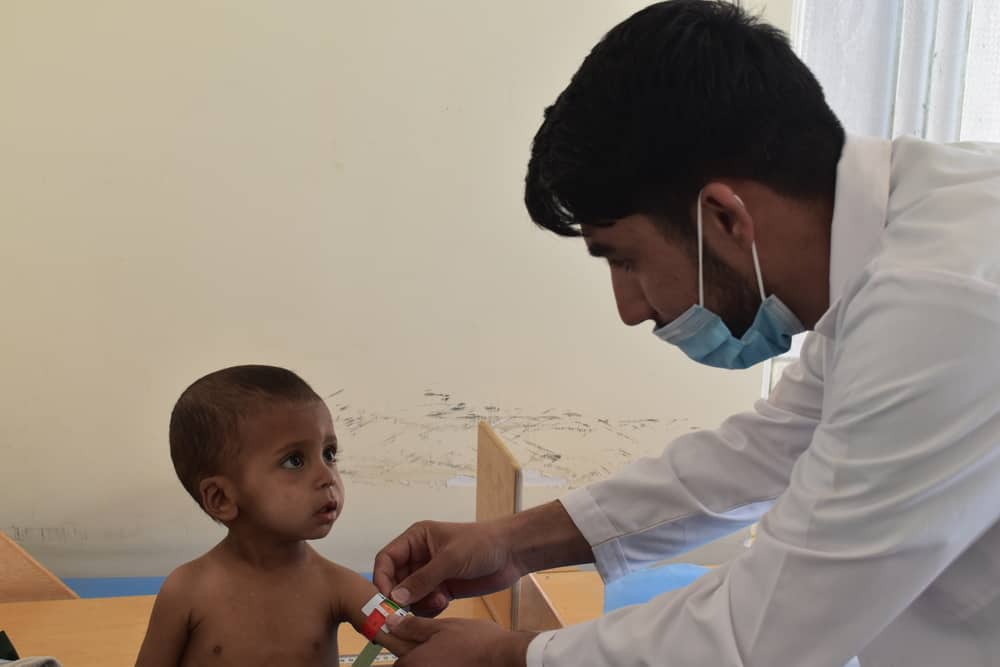
Treating malnutrition
In both Herat and Helmand provinces, we treat malnourished children in inpatient therapeutic feeding centres; those coming to the centre at the regional hospital in Herat have often travelled some distance to get there.
In 2024
Médecins Sans Frontières (MSF) runs a range of projects in Afghanistan, responding to the immense medical needs caused by decades of conflict and political upheaval, particularly among women and children.
In 2024, Médecins Sans Frontières (MSF) continued its unwavering commitment to addressing the pressing healthcare needs of Afghan communities amidst significant challenges. MSF’s continued efforts to provide specialised healthcare across the country, in collaboration with the Ministry of Public Health and its dedicated personnel, whose support has been instrumental in delivering medical care.
During the year, there was a gradual but stable increase in the number of patients coming to MSF facilities in Afghanistan, largely due to the improved security situation, which made it easier for people to travel. However, many Afghans continue to face huge challenges in accessing care.
In a broken economy, many cannot afford medical assistance. The public health system in Afghanistan has also been under-resourced, under-funded, and over-burdened for years, and remains unable to meet people’s needs. In 2024, MSF teams in Afghanistan continued to witness very high bed occupancy rates, often reaching 130 to 200 percent in most facilities.
We ran nine projects in eight provinces, maintaining a strong focus on emergency care, surgery, and mother and child health. We also carried out an emergency response in October 2024, after four 6.3 magnitude earthquakes hit Herat province, killing more than 2,000 people and displacing over 250,000. MSF donated emergency kits and helped treat the wounded at Herat Regional Hospital, the main treatment facility for earthquake victims.
The situation for women did not improve in 2024. Following the Taliban’s decision to ban women from working for NGOs and limit their access to higher education opportunities, MSF continued to condemn the gradual erasure of women and girls from public life in the country. In April, the ban was expanded to include women working for the UN. In order for essential services to be available to everyone, there must be no constraints on who can deliver them. Women must be allowed to work and train as medical professionals.
Bamyan
In December 2022, MSF started a community healthcare programme in Bamyan, delivering healthcare services to remote and underserved districts in the province. We initially focused on mother and child healthcare, including obstetric
and gynaecological consultations, support for non-complicated deliveries, and outpatient services for children under five. We also worked to boost the provincial hospital’s capacity for treating measles and COVID-19 patients, a short-term project that has since ended.
In 2024, we continued to see significant needs for general outpatient services, prompting us to further expand our services. We also administered routine vaccinations to protect children from preventable diseases while responding to outbreaks of measles and acute watery diarrhoea.
Helmand
MSF supports Boost provincial hospital in Lashkar Gah, offering a wide range of medical services, including emergency, paediatric, neonatal and maternity care, surgery, and internal medicine. Boost remains MSF’s largest project in Afghanistan, and in 2024, the hospital continued to operate beyond capacity, managing a high volume of emergency cases and maternal and paediatric care. Many patients traveled long distances from other provinces to reach the facility, often arriving in critical condition.
Herat
In Herat province, MSF continued its work in the paediatric department at the Regional Hospital, supporting triage, the emergency room, inpatient and outpatient therapeutic feeding centres, the paediatric intensive care unit, and an intermediate care unit. Throughout 2024, our teams treated a high number of severely ill children in these units.
In Kahdestan, in Injeel district, our outpatient clinic provided care for pregnant and lactating women, treated children with moderate acute malnutrition, and offered general health services. Malnutrition remained a significant focus of our work, and we continued to expand the feeding centre’s capacity to meet growing demand.
Kabul
In Kabul, MSF continued to treat patients with malnutrition and measles at Maiwand Teaching Hospital. Due to space constraints and a growing demand for inpatient care, MSF ended activities at the hospital on December 26, 2023, and relocated to a larger facility in the capital in early 2024. We also maintained our assistance to the Afghan Midwives Association’s pilot project, offering funding and technical support for deliveries, antenatal and postnatal care, and family planning.
Kunduz
The MSF Trauma Centre in Kunduz continued to serve as a critical facility for emergency care, receiving over 32,000 patients in 2024. Our teams performed nearly 4,750 surgical procedures, treating severe injuries and life-threatening conditions. The antimicrobial stewardship programme at the Trauma Centre played a vital role in addressing multi-drug-resistant infections, improving patient outcomes and ensuring responsible use of antibiotics.
Khost
In Khost, MSF focused on Comprehensive Emergency Obstetric and Neonatal Care (CEmONC), enabling safe deliveries and improving maternal and neonatal outcomes. The establishment of a microbiology laboratory in 2024 enhanced our ability to combat antimicrobial resistance, improving diagnostic capabilities and ensuring responsible antibiotic use.
OUR ACTIVITIES IN 2024
-
Related:
- Afghanistan
- MSF in Afghanistan












